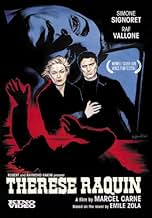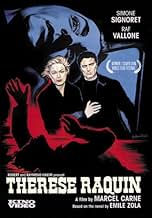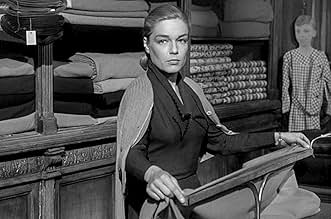A truck driver kills the husband of the woman he loves, and becomes the object of blackmail.A truck driver kills the husband of the woman he loves, and becomes the object of blackmail.A truck driver kills the husband of the woman he loves, and becomes the object of blackmail.
- Awards
- 2 wins & 2 nominations
Martial Rèbe
- Grivet
- (as Martial Rebe)
Francette Vernillat
- Françoise, la bossue
- (as Françoise Vernillat)
Madeleine Barbulée
- Madame Noblet, une cliente
- (as Madeleine Barbulé)
Storyline
Did you know
- TriviaRaf Vallone refused to be dubbed in the French version and had his contract amended accordingly. The scenario was also slightly changed to "Italianize" the character of Laurent.
- ConnectionsFeatured in Mémoires pour Simone (1986)
Featured review
People generally think that Carné's heyday comes to an end with "les portes de la nuit" (1946)And it's sure that- whatever the new wave's view on the matter-these thirties and forties movies are among the very best French cinema gave to the world("le jour se lève" "quai des brumes""les enfants du paradis" and "hôtel du nord" ,to name but four are the crème de la crème ,easily equalling the best of Renoir)One always tries to minimize Carné's importance,mentioning the actors (Gabin,Arletty,Simon,et al)and Jacques Prévert's screen plays.One often forgets that Carné did direct these masterworks and he always chose the right actors,decorators(Alexandre Trauner who was to work in Hollywood later),musicians,with mind-boggling results.
"Therese Raquin" (1953)came before the new wave but Carné 's credibility was sinking fast and he was given the coup de grace by his young "nouvelle vague" colleagues -before being restored to favor after 1980,actually after he stopped directing ."Therese Raquin is a fine mixing of pre and post -war elements
Pre-war:the lovers' impossible dream,fate -here represented by a young sailor-,scumbags who cannot stand true love-the scene on the train between Raf Vallone and Jacques Duby recalls the famous one between Jean Gabin and Jules Berry in "le jour se lève" (1939) particularly when Vallone screams"are you gonna shut your mouth?"(the lines are almost the same).
Post-war:the influence of the film noir-which was influenced by Marcel Carné's work mainly "le jour se lève"-who cares if it's a Zola adaptation?:the scenarists have transposed the action to the fifties,to the era of the making of the movie,and James Cain could have written it as the story reminds the spectator "the postman always rings twice:more than Tay Garnett's excellent version(1946),"Therese Raquin" is actually closer to Luchino Visconti's (Ossessione,1942),because of the Italian Raf Vallone's presence.
But in spite of the transposition,Zola's spirit remains intact:the stifling petit bourgeois milieu in which Thérèse (Simone Signoret)lives is meticulously depicted:the notions store ,the walk on the Rhone banks,the ludicrous board game,the dreadful mother-in-law(Sylvie is absolutely extraordinary;after she suffered an attack after her son's death,she's completely paralyzed ; only her eyes (her frightening eyes) are alive,accusing her daughter-in-law:Cain's eye in the Bible.In her over possessive part of a mother who has turned her only child into a poor guy,a sissy,Sylvie surpasses the excellent Signoret and Vallone.
No,Carné's career was not over in 1946,but after "Thérèse Raquin",the slump began:""les tricheurs" (1958)tried to catch up with the nouvelle vague with mixed artistical results,but has remained watchable."Trois chambres à Manhattan" (1965)was moderately interesting,thanks to its stars ,Maurice Ronet and Annie Girardot.After,it's downhill:"les jeunes loups" (1967)is a would be "a la mode" bomb,"les assassins de l'ordre"(1971) tried André Cayatte's style ,not exactly the right move and "la merveilleuse visite"(1973) failed dismally(as in "les visiteurs du soir",(1942),Satan sent two people,it's God's turn who send an angel!)
"Thérèse Raquin" should not be missed.You won't be disappointed .
"Therese Raquin" (1953)came before the new wave but Carné 's credibility was sinking fast and he was given the coup de grace by his young "nouvelle vague" colleagues -before being restored to favor after 1980,actually after he stopped directing ."Therese Raquin is a fine mixing of pre and post -war elements
Pre-war:the lovers' impossible dream,fate -here represented by a young sailor-,scumbags who cannot stand true love-the scene on the train between Raf Vallone and Jacques Duby recalls the famous one between Jean Gabin and Jules Berry in "le jour se lève" (1939) particularly when Vallone screams"are you gonna shut your mouth?"(the lines are almost the same).
Post-war:the influence of the film noir-which was influenced by Marcel Carné's work mainly "le jour se lève"-who cares if it's a Zola adaptation?:the scenarists have transposed the action to the fifties,to the era of the making of the movie,and James Cain could have written it as the story reminds the spectator "the postman always rings twice:more than Tay Garnett's excellent version(1946),"Therese Raquin" is actually closer to Luchino Visconti's (Ossessione,1942),because of the Italian Raf Vallone's presence.
But in spite of the transposition,Zola's spirit remains intact:the stifling petit bourgeois milieu in which Thérèse (Simone Signoret)lives is meticulously depicted:the notions store ,the walk on the Rhone banks,the ludicrous board game,the dreadful mother-in-law(Sylvie is absolutely extraordinary;after she suffered an attack after her son's death,she's completely paralyzed ; only her eyes (her frightening eyes) are alive,accusing her daughter-in-law:Cain's eye in the Bible.In her over possessive part of a mother who has turned her only child into a poor guy,a sissy,Sylvie surpasses the excellent Signoret and Vallone.
No,Carné's career was not over in 1946,but after "Thérèse Raquin",the slump began:""les tricheurs" (1958)tried to catch up with the nouvelle vague with mixed artistical results,but has remained watchable."Trois chambres à Manhattan" (1965)was moderately interesting,thanks to its stars ,Maurice Ronet and Annie Girardot.After,it's downhill:"les jeunes loups" (1967)is a would be "a la mode" bomb,"les assassins de l'ordre"(1971) tried André Cayatte's style ,not exactly the right move and "la merveilleuse visite"(1973) failed dismally(as in "les visiteurs du soir",(1942),Satan sent two people,it's God's turn who send an angel!)
"Thérèse Raquin" should not be missed.You won't be disappointed .
- dbdumonteil
- Feb 5, 2002
- Permalink
- How long is The Adultress?Powered by Alexa
Details
- Runtime1 hour 42 minutes
- Color
- Aspect ratio
- 1.37 : 1
Contribute to this page
Suggest an edit or add missing content
















